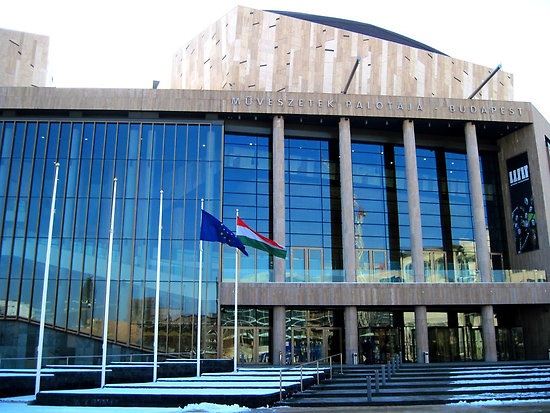Meetings in Hungary – 2011
By Theodora Pavlovitch, IFCM ExCom member
Share and learn – under this title the International Music Council* held its meeting from March 30th to April 2nd in Hungary on the invitation of the Hungarian Music Council. Leaders of the important international music organisations took part in the event followed by a meeting of the IMC Executive Committee. The meetings were an official programme of the Hungarian Presidency of the council of the European Union and were connected to the Budapest conference of the European Festivals Association (EFA) organized by Hungarofest Ltd., the Palace of Arts in Budapest and Budapest Spring Festival in the Ferenc Liszt Year, 2011.
The first part of the event took place in the Hungarian Choral Castle in Pomaz, one of the newest homes for a large variety of music activities. The venue provided wonderful conditions for intensive and fruitful work and the Castle’s Director Gabor Moczar (Vice President of Europa Cantat European Choral Association) took care of every small detail in order to make the presentations and discussions efficient. Host of another part of the meetings was the Palace of Culture, a brilliant example of modern architecture in the centre of Budapest, whose teams in the concert and conference halls offered warm hospitality to the participants of the IMC and EFA Conference.

Leaders and representatives of the International Music Managers’ Forum, the International Federation for Choral Music, the International Association of Music Information Centres, Jeunesses Musicales Internationales, European Association of Conservatories, Académies de Musique and Musikhochschulen, European Conference of Promoters of New Music, European Orchestra Foundation, Europa Cantat European Choral Association and many other important music organisations took part in the meeting.
Among the subjects of the meeting, special attention was given to the problems of music education in schools. Sarah Hennessy – President of the European Association for Music in Schools (in cooperation with ISME) – presented the theme Exchange of good practices expounding researches and good examples for activating music education in schools. “How to reach the public outside the conference room” by Eve O’Kelly (consultant at the International Association of Music Information Centres) was another subject that aroused great interest among the participants. In general, IAMIC showed a very innovative view of music in the twenty-first century and the Association’s Annual Conference “The Future of Music in the digital world” (held in June 2010 in Dublin ) attracted 24.000 people to visit IAMIC’s web-site.
A workshop on fundraising was led in a very attractive way by Philip Speding – a specialist from the British Company ”Arts&Business”. Jeunesses Musicales Internationales and its communications officer Matt Clark presented “The use of social media in cultural NGOs” – a subject that raised a lot of questions. Sonja Greiner, the Secretary General of Europa Cantat European Choral Association presented the result, the vision and the challenges after the merger (completed in January 2011) of the two big European Choral organizations – Europa Cantat EFYC and AGEC.
A very important additional part of the meeting was the Conference of the European Festivals Association (EFA) held in the programme of the Hungarofest Conference. Speakers at the Conference were experts such as Balint Odor (Ministry of Foreign Affairs, Hungary), Geza Entz (Ministry of National Resources, Hungary), Franz Patay from the International Music and Media Centre Vienna, and many others who shared their significant experience and high level results. The role of the regional strategies in the EU and the role of culture as a means for regional development was a focus of several different presentations and discussions.
Among the most intensive parts of the Conference was the round table discussion on new initiatives to create inter-regional and intercontinental cultural dialogue. It was clear that in this context the expertise of the International Federation for Choral Music could be very helpful.
A series of concerts in the framework of Budapest Spring Festival were included in the programme of the Conference and the European Union Youth Orchestra presented the event’s Closing Concert.
Congratulations and thank you for the remarkable event! This we would like to address to Frans de Ruiter (President), Beata Schanda (Vice President) and Silja Fisher, Secretary General of the International Music Council for their efforts and vision about the headlines and future of the music world! The best demonstration of this is the next big event of IMC: its 4th IMC World Forum on Music and 34th General Assembly in Tallinn, Estonia, September 26 – October 1 2011 under the title “Music and Social Change”.
Liveliness of presentations and discussions, active participation of everyone taking part and important conclusions – these were the main values of the meetings of the International Music Council organized and hosted by Hungary. We believe that the rich experience and good practices of the International Federation for Choral Music in the field of inter-cultural dialogue could serve as an example for many other music organisations, members of the International Music Council.
In such a way our work will be even better recognized and esteemed by the world music society. Let’s share and learn!
- The International Music Council (IMC), founded in 1949 by UNESCO, is the world’s largest network of organizations, institutions and individuals working in the field of music. The International Music Council promotes musical diversity, access to culture for all and unites organizations in some 150 countries worldwide in building peace and understanding among peoples of all cultures and heritage.
Edited by Gillian Forlivesi Heywood, Italy

